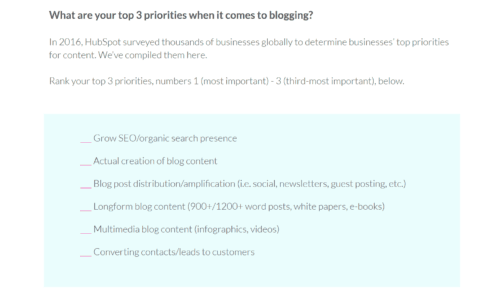Editor’s note: We’re all about keeping things fresh. This list of content marketing questions to ask a client has been updated since its initial publication to reflect the latest trends and information in the wide, wonderful world of content marketing.
When you sit down with a new client, you want to do what it takes to close the sale and make sure that they choose your agency over others. In many cases, you may avoid asking too many questions in an effort to seal the deal. Unfortunately, that behavior can lead to confusion and ambiguity down the road. By knowing the content marketing questions to ask a client up front, you can avoid future frustration on both ends. You’ll also ensure you’re taking on clients with whom you’ll be able to work well moving forward.
The next time you sit down for the first strategy session with a potential client, make sure you’re addressing all these fundamental marketing questions. This communication will get you on the same page before you move forward with your contract together.

1. Why Do You Want to Create Content?
There are plenty of great reasons for creating content—including high-volume content that’s pushed out fast to get plenty of new visitors to a website. Content can increase a brand’s presence and customers’ awareness of that brand. It can also help to change public perception and provide valuable information to customers who are considering the brand. Good content generates leads and conversions for the company.
Before entering into a partnership with a business client, however, you need to know their specific reasons for creating content. Have a go-to list of content marketing questions to ask a client about what they hope to accomplish with their content, in order to better understand their priorities.

For inspiration on what sort of questions to ask for website content, take advantage of the blog content strategy worksheet included in our free, downloadable Agency Content Kit. Go through the worksheet together in your meeting to determine your client’s priorities, what their current content status is, and what they’d like it to be.
Our kit also includes helpful tips on how to sell content marketing to potential clients, in case they’re not yet convinced of the value your agency can provide. Demonstrate your expertise by helping them understand the current state of content creation for a more effective game plan moving forward. Go into detail about how they expect the content to perform.
The more information you get and share now, the better you’ll be able to set—and meet—expectations in the future.
2. What Products & Services Do You Sell? What Language Do You Use to Talk About Them?
This is a critical step in handing over the content production from the company’s internal team to a ghostwriter. Chances are, the company has put a lot of time and effort into creating content guidelines. These will cover how they talk about specific products and services, what type of information they want to share with their audience, and how they want that information to be messaged. There’s a certain “feel” for the way they introduce their brand, including specific language that is used. They’ve likely developed certain ways of introducing a product and overall style guidelines that bolster their brand identity.
A company’s persona needs to be consistent across all of their content streams: social media, their website, their blog, and anywhere else. Consistency helps buyers remember the brand better and convinces them of the authenticity of the company. It also ensures that customers have the same brand experience no matter where they connect with the company.
When you take over as a content creator for the company, your job is to maintain the consistent image already created. There are a variety of content marketing questions to ask a client to better understand this existing image. Take the time to familiarize yourself with the brand’s tone before you get started. Otherwise, you may find yourself facing multiple rounds of edits before the job is done.
3. What are You Looking for in an Agency?
Before you can build a strong relationship with a client, you need to know what they’re looking for in an agency. Some clients are satisfied with an agency that is available during specific business hours. Others want an individual who is responsive no matter when they make contact—on Saturday, after the end of the business day, or on a holiday, for example. It’s important to get clear expectations from the client up-front to know their preferred method.
Many clients focus on communication: they want an agency who will communicate with them transparently throughout the process. This lets them know where you are and gives them plenty of opportunities to change their instructions as they see what you’re able to create.
On the flip side, there are other clients who prefer that you take the details and run with them, contacting them only when you have a complete product. Clients may also be looking for specific digital marketing skills, from cybersecurity to data analysis and adaptability.
Understanding what your client wants is the first step in delivering not only the content they want, but also the relationship they want. A satisfied client isn’t just one who is happy with your finished product. It’s one who receives the service they want on the timeline they’ve established—potentially over and over and over again. If you don’t know the details of that expected service, you can’t provide it.
4. Who are Your Readers? How Do They Absorb New Information?
Many writers find that there is a disconnect between the way they present information and the way readers process it. It’s critical to be sure that you’re speaking the same language as the people who will be reading your content. This isn’t just about understanding the distinction between American and UK English—although that’s certainly a critical point. You also want to be sure that you’re providing information in a format that can be easily understood by the people who will be reading it.
Real talk: The most technical piece of content you’ve ever written may have been highly satisfying for you. If the customers don’t understand it, however, it’s useless. Before you start writing, make sure you understand what’s expected of you by asking the client content questions about their readers. Do the customers understand jargon or technical terminology? Do they need an in-depth study of certain products or a back-to-basics overview?

Listen to customers
Browse through social media content and reviews written by customers. How do they talk about the company and its products? What language do they use to describe specific products or services? Understanding how customers talk about the company will help you write about it in a way they will relate to and understand.
Understand customers’ pain points
Think of content marketing discovery questions for clients concerning what their customers need from their particular company. What pain point do their products or services address?
Talk through customer personas
Customer personas are essential to understanding who you’re writing for. Make sure you understand who your client’s buyer personas are before you get started writing. What you’d write for a 60-year-old grandmother who uses her computer only to keep up with her grandchildren is very different from what you’d write for a 30-year-old business professional who carries his laptop with him everywhere he goes.
Understanding your client’s buyer personas from the outset will make it easier for you to address your work directly to them.
5. What Types of Content do You Want to Provide?
Content takes all forms, from articles to videos to infographics, white papers, and more. Ask your client content strategy questions regarding what type of deliverables they think will meet their needs, given their content goals and audience. Keep in mind the importance of maintaining the client’s voice and messaging across various mediums, too.
While certain types of content make more sense for some businesses, say white papers for a more technical business, others—like blog posts and articles—are staples for nearly every brand. This written content likely will form the backbone of your content marketing strategy. Consequently, it’s important to be sure you can deliver consistent, high-quality pieces to your client on an ongoing basis.
But how do you create written content that reliably hits the mark every time—that strikes the right balance between technical and accessible, informative and fun, especially in an industry you may not be familiar with?
Consider enlisting the help of the community of 3,000 talented freelance writers at Verblio. Whether you need white papers, blog posts, e-books, or other types of content, our writers are on it. Your client will love the expert, engaging writing, and you’ll love being able to focus on your own priorities, from SEO to strategizing to other types of marketing.
6. Who are Some of Your Content Heroes?
When your client thinks of the highest-quality content out there, who are they thinking about? What does their image of a successful blog post look like?
Ask clients for examples of their content heroes and star examples, then emulate them in order to successfully produce the kind of content your client wants. You’ll see this question on the worksheet in our Agency Content Kit, too, so you can walk through your client’s preferences together in a sit-down meeting.
If you need some examples, provide your client with a look at some of these content giants as a solid starting point.
- Forbes provides high-quality, useful content geared toward business professionals.
- Huffington Post keeps up with the latest information in a variety of fields, offering consistent, well rounded information in a lighter, easier-to-follow format for many readers.
- Babble provides a high volume of amusing content geared toward moms.
- Digg aims to identify and share viral content.

7. How do You Measure the Success of Content? What Metrics Are Important to You?
One of the most crucial content marketing questions to ask a client is how they will measure the success of your efforts. From traffic to engagement to conversion, we can monitor all sorts of metrics in today’s data-driven world. Which ones matter to your client? Hopefully, they are thinking beyond one-time sales and understand the importance of building a brand to generate lasting engagement. If not—or if they have no idea what metrics they should be looking at—then it’s a good thing they’ve got you.
Together, you can nail down the numbers that will indicate both to you and your client whether your content has been successful. Document these goals in your content marketing questionnaire, so they’re shared, accessible, and understood by all.
Then, you’ll know what you’re aiming for. You’ll easily be able to identify when you’re on the right track—and when you might need to pivot your strategy.
8. How are Decisions Made Internally?
This should be one of the last questions for clients in a meeting, so you don’t lose steam. Essentially, you want to know the difference between who controls the budget and who approves the product. Understanding the logistics of a new company is critical to a seamless working relationship. It can help you understand delays and hierarchies, and determine whose preferences really need to be carried out or who is the point-person for day-to-day questions. It will also provide you a deeper understanding of how the company works from the inside. This enables you to be as effective as possible as their agency. In many cases, this discussion will also open the doors to cross-selling or give you background on a potential need for additional services, allowing you to let the client know what else you have to offer.
By asking these critical questions while you’re still in negotiations with a new client, you can substantially improve your understanding of their needs. This, in turn, will improve your ability to deliver the content that they’re asking (and paying!) for. Not only that, but you can create a proposal that will align with both their budget and their expectations in terms of content throughout your contract.
Don’t dive in blind! Come to your meeting prepared with content marketing strategy questions. Find these questions and other resources in our free Agency Content Kit, designed to help you set up and shape up a better relationship with your client.



